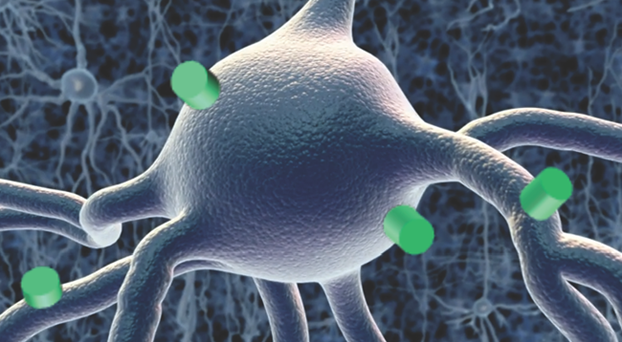The bioelectronics medicine vision aims to interface the central and peripheral nervous systems and correct aberrant neurological circuits by injecting correcting signals. As part of this vision, we aim to develop inorganic nanoparticles that self insert into the membranes of live neurons and optically report on changes in their membrane potentials. The technology that we aim to develop will afford not only the real time recording of neuronal circuit activity, but will also open up vast opportunities in utilizing biomimetic artificial inorganic ‘membrane proteins’ for alternative energy generation, light harvesting, compartmentalized catalysis across membranes and many others. The goal of the laboratory for nanosensors in brain research is to turn this vision into a reality.
As part of this vision we have already demonstrated targetable voltage sensing inorganic nanoparticles (vsNPs) that self-insert into the cell membrane and optically record, non-invasively, membrane potential on the single-particle level, at multi-sites and in a large field-of-view. Using the first generation of vsNPs, we measured large quantum confined Stark effect (QCSE) shifts as function of voltage for single nanoparticles (in-vitro, using electrodes). We developed a surface functionalization approach that is based on adsorption of engineered trans-membrane peptides to the surface of the nanoparticles and demonstrated successful membrane insertion by cryo-EM imaging. Preliminary evidence for membrane voltage sensing by membrane-inserted vsNPs was obtained in spontaneously spiking engineered HEK cells and patch-clamped wild-type HEK cells. With further improvements, vsNPs could potentially be used to study signals from many neurons in a large field-of-view over a long duration. Moreover, they could potentially report and resolve voltage signals on the nanoscale. vsNPs could therefore be generally useful for the study of action potential signals in the central and peripheral nervous systems and in muscle tissues.
We currently have several M.Sc. and Ph.D. open positions for outstanding and highly motivated students to work on this. Specifically, projects in molecular biology, protein chemistry, electrophysiology and optics are available. Selected students would gain the opportunity to work in a highly multidisciplinary environment engaging in the fields of optics and spectroscopy, nanoparticle functionalization, protein engineering and neuroscience, using state of the art instrumentation. The offered training, the acquired skill-set, and gained experience are highly desirable both in academia and in industry.
Contact Us:
Prof. Shimon Weiss
sweiss@chem.ucla.edu
Dr. Asaf Grupi
grupia@gmail.com
Cell: 055-8836567
Work: 03-7384313
